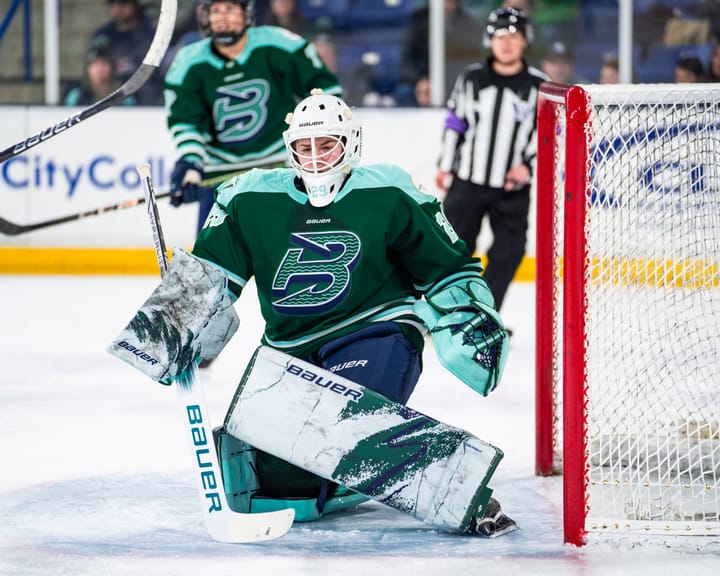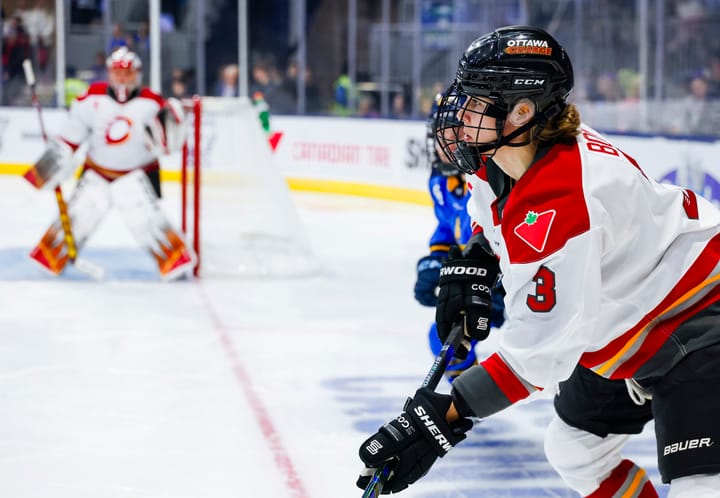Hilary Knight discusses her journey on Just Women’s Sports podcast
The US star talked with Kelley O’Hara
On Aug. 11, Hilary Knight was a guest on Kelley O’Hara’s Just Women’s Sports podcast, which has already established itself as a must-listen show. For those who don’t know, O’Hara plays for Utah Royals FC in the NWSL and is an Olympic gold medalist and a two-time FIFA World Cup champion. So, yeah, she knows a thing or two about women’s sports world.
The Knight episode of the podcast runs 53:29. It provides a unique glimpse into who Knight is beyond an intermission or post-game interview, a social media post, or a quote in an article about the PWHPA or the rivalry between Team USA and Team Canada. Refreshingly, O’Hara’s show is much more of a conversation than it is an interview. So, we get the affable, goofy Knight instead of the Knight smoldering with enough competitive fire to chill the veins of an entire country of people.
The show starts with the pair discussing Knight’s hockey beginnings and the path she took to the U.S. women’s national team. Sprinkled throughout the retelling of her story are captivating tidbits about her early relationship with the game, including the fact that she couldn’t lift the puck until high school. She also shares the story of her worst “hockey” injury, but you’ll have to listen to the episode to hear it. There’s blood. And plastic surgery. And a hole where it shouldn’t be.
Just before entering her teens, Knight made the decision to go all-in on hockey. That meant going to boarding school, which was the best path for getting recruited to a top NCAA program. She went to Choate Rosemary Hall in Connecticut, which has also produced Angela Ruggiero and Julie Chu, and immersed herself in the game that is now a pillar of her life.
“I would skate like seven days a week, which is kinda crazy now, what was I thinking,” said Knight. “But you just get so passionate about it and obsessed, in a healthy way. You’re addicted to getting better and learning more. In any sport, when you get higher and higher I feel like you get more humbled and there’s more humility involved.”
As you might expect, the creation of the PWHPA is also a major topic of the conversatio between Knight and O’Hara. It’s discussed around 40 minutes into the episode. So too is Knight’s decision to leave the NWHL and return to the CWHL in 2017-18 to play with Les Canadiennes de Montréal.
“The [NWHL] was this promising, shiny new thing that was supposed to take us into the future in the landscape of pro women’s hockey,” Knight explained. “Then, personally, for me, I was like, ‘This isn’t going anywhere, I’m not doing this anymore.’ I was one of the leaders for getting people into the league and doing the media tour for it and the heavy-lifting — not launching it — but getting fans to it, right? It was so promising ... I went back up to the CWHL which had loads of issues in itself, but, competition-wise, I felt it was the best to prepare me for the U.S. schedule.”
Knight shared that before the CWHL folded there was a plan among members of the national team to get “all of the talent” back in the CWHL. So, the CWHL’s sudden collapse came as an unwelcome surprise to her and her teammates before they arrived in Finland for the 2019 IIHF Women’s World Championship. The conversation that resulted in the creation of the PWHPA began when the U.S. and Canadian women’s national teams met before the beginning of that tournament.
Needless to say, it’s enlightening to hear Knight’s unfiltered take on the current landscape of pro women’s hockey and what she hopes to see in whatever comes next. It’s widely known that her voice and opinion carry a great deal of influence among both national team players and the best post-collegiate players outside of that pool. She wants the next generation to not have to go through all of the growing pains of the CWHL and NWHL.
“We’re trying to build and establish a sustainable future for the sport,” said Knight. “And people ask, ‘What does sustainable mean?’ (It’s) making sure that the next generation has ample opportunity to play at this level and all the resources surrounding that for her to succeed, a growth model, and (all the) little, practical things that any business would need to grow – and to be a business, to be honest.”





Comments ()